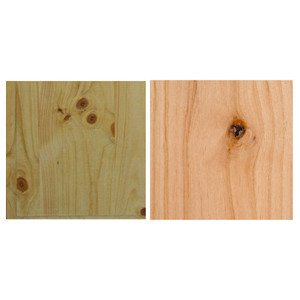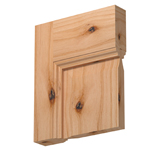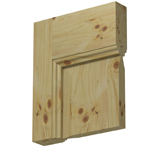
Alder vs Pine: Choosing the Right Wood for Swinging Doors
Which Wood is Better: Rustic Alder or Eastern White Pine for Western-Style Saloon Doors?
When choosing a wood species for your custom swinging saloon doors, two standout options are rustic alder and Eastern white pine. Both woods offer unique visual appeal and performance qualities—but which is the better fit for your home or business? In this guide, we’ll compare alder wood vs pine, covering everything from durability and stainability to cost and rustic charm.
Key Takeaways:
- Alder is a hardwood known for durability, a smooth grain, and excellent stain absorption.
- Pine is a softwood that’s lightweight, affordable, and full of rustic character.
- Rustic alder is generally more expensive and better suited for high-traffic areas.
- Eastern white pine is ideal for lighter-use areas and rustic, country-style interiors.
- The choice between knotty alder vs knotty pine comes down to aesthetic and durability needs.
Rustic Alder Wood Overview

What Is Rustic Alder?
Rustic alder is a medium-density hardwood sourced from the Pacific Northwest. It features a consistent light brown color with subtle yellow and red undertones. Known for its straight grain and distinctive knots, rustic alder wood gives swinging doors a refined yet rustic feel.
Advantages of Alder Wood:
- Takes stain and finish exceptionally well
- Provides long-lasting strength and stability
- Ideal for high-traffic or frequently used doors
- Durable enough to resist dents and scratches
- Adds value with a more upscale hardwood appearance
Is Alder Wood Expensive?
Yes, alder is typically more expensive than pine. However, its durability and versatility can make it a worthwhile investment, especially in busy areas or when a polished look is desired.
Eastern White Pine Overview

What Is Eastern White Pine?
Eastern white pine is a softwood native to the eastern U.S. It features pale yellow to creamy white tones with natural greenish hues and knotty patterns. Pine wood offers a laid-back, rustic aesthetic perfect for casual or country-style interiors.
Advantages of Pine Wood:
- Lightweight and easy to work with
- More affordable than alder
- Absorbs stains well, though may require pre-treatment
- Great for low-traffic areas or decorative installations
- Environmentally friendly—harvested from managed forests
The Differences in Knotty Alder and Eastern White Pine
To pick the best wood for your swinging doors, you need to know the available options! Rustic Alder and Eastern White Pine are two prominent choices.
|
Feature |
Knotty Alder |
Knotty Pine |
|
Density |
Medium (Hardwood) |
Low (Softwood) |
|
Durability |
More resistant to dents |
More prone to wear |
|
Appearance |
Subtle, uniform grain with knots |
Distinct grain and knot patterns |
|
Staining |
Stains evenly and richly |
May blotch without pre-treatment |
|
Cost |
Higher |
Lower |
Which Wood Is Best for Your Saloon Doors?
If you need strength, long-term durability, and a wood that finishes beautifully, rustic alder is likely your best bet. If you’re working on a tighter budget or aiming for a traditional cabin-style look, Eastern white pine will deliver charm and character at a lower cost.
Use alder if you want:
- A long-lasting, high-traffic solution
- Consistent stain and finish results
- A cleaner grain with rustic touches
Use pine if you want:
- Budget-friendly rustic aesthetics
- Lightweight materials for easier installation
- A more rugged, natural appearance
Get Custom Saloon Doors in Your Preferred Wood
At Swinging Cafe Doors, we specialize in custom swinging doors made from rustic alder, Eastern white pine, and a variety of other hardwoods and softwoods. Whether you prefer a farmhouse vibe or a clean, modern rustic look, we’ll help you design the perfect saloon-style doors for your home or business.
Ready to get started?
Get a Custom Quote or browse our full selection of swinging doors today.
